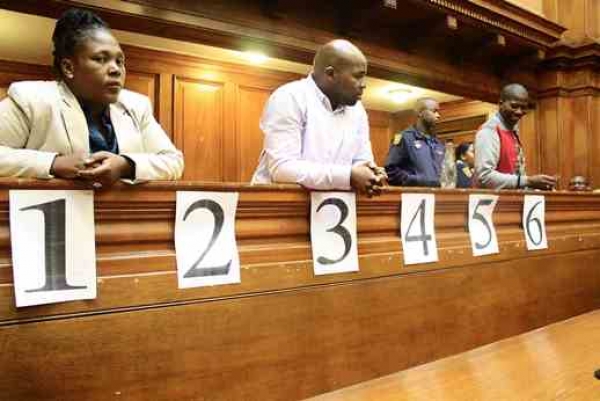Twist in Angy Peter trial: None of the accused will go to prison

Angy Peter, her husband Isaac Mbadu, Azola Dayimani and Christopher Dina will not get prison sentences. They have also been given bail. Dayimani and Dina were released today. Peter and Mbadu are expected to be released from Pollsmoor tomorrow.
The four were convicted nearly two months ago of the murder and kidnapping of Rowan du Preez in 2012. Du Preez was found necklaced in Mfuleni. During their trial, it was argued by the defence that the four were framed by the Mfuleni police.
Judge Robert Henney said that restorative justice would be more appropriate than a prison sentence.
Henney said it would not be in the interests of Peter’s and Mbadu’s children for the accused to go to prison. He spoke at length about the difficulty for the children if both parents were imprisoned, and the impossibility of determining which one goes to prison. (Dayimani and Dina are not the primary caregivers of children.)
Henney also cited the unusual circumstances of the case, which included the attempts by the accused to rehabilitate du Preez from a life of crime. Yesterday defence advocate William King explained how Mfuleni police officer Andile Tshicila had bought a television du Preez had stolen from Peter and Mbadu, and how the Mfuleni police failed to act against Tshicila.
This is a summary of the order Henney gave today:
The accused will be released on bail of R2,000 which they had already paid. They may not have any contact with state witnesses.
Joel Bregman of the SJC has been tasked with compiling a document on the “application of Restorative Justice to this matter”. The document will include a substantial role for the SJC. The organisation will “exercise control and management” over the restorative justice process. Among other things, this will include meetings between the accused and du Preez’s family.
The document Bregman has to compile must be presented to the Director of Public Prosecutions and the lawyers of the accused by 12 December 2014.
The parties will then have until 16 January 2015 to comment on the SJC’s proposals.
The SJC must then consider these proposals, amend the document if necessary, and submit it to the court on 6 February 2015.
The court will then consider the matter again on 12 February 2015.
Du Preez’s grandfather John Ndevu said that the family will work with the various parties to facilitate reconciliation. Ndevu said, “I am a forgiving man when someone asks for it and admits they are wrong.”
Bregman told GroundUp that the success of the restorative justice process will depend on multiple parties not just the SJC. “Everyone needs to be comfortable with the process. Meetings between the accused and the family will need to take place at a neutral venue, and we will endeavour to be unbiased in the process.”
It remains unclear if Peter and the other accused will appeal their guilty verdict.
Next: Factions fuel violence at Durban hostel
Previous: Massive march to Parliament to demand Shabangu does more to end violence

This article is licensed under a Creative Commons Attribution-NoDerivatives 4.0 International License.


